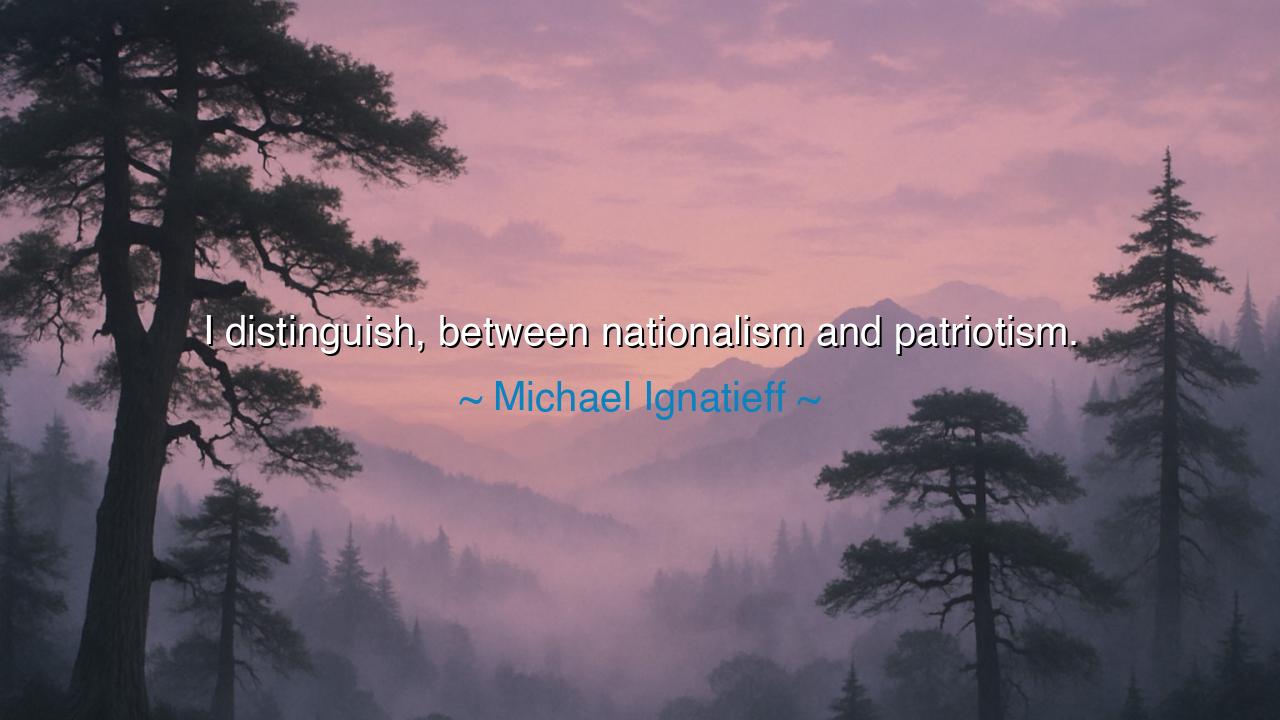
I distinguish, between nationalism and patriotism.






Hearken, children of the future, and attend to the profound discernment of Michael Ignatieff, who speaks with measured clarity: he distinguishes between nationalism and patriotism. Though in the hearts of men these words may often be used interchangeably, Ignatieff warns that their spirits are distinct. Patriotism is a noble flame, a love of country tempered by reason, justice, and compassion. It seeks the flourishing of the people, honors truth, and tempers devotion to the land with humility and conscience. Nationalism, by contrast, can burn uncontrolled, consuming those who do not conform, elevating pride into arrogance, and twisting loyalty into exclusion or aggression.
The origin of this reflection lies in the annals of history, where nations have been shaped and broken by the differing forces of devotion. In the hands of the wise, patriotism fosters unity, courage, and a commitment to the common good. In the hands of the unbridled, nationalism becomes a tool for division, a banner under which fear, suspicion, and contempt for others are cultivated. Ignatieff, a thinker attuned to the moral complexities of civic life, reminds us that true love of country must never descend into the idolization of power or the oppression of difference.
Consider the luminous example of George Washington, the father of a fledgling nation, whose patriotism was tempered by prudence and a steadfast adherence to principle. He loved his country with devotion, yet he did not seek to conquer or dominate others beyond its borders. His loyalty inspired unity and resilience, establishing a republic grounded in liberty and mutual respect. In contrast, we might reflect upon the fervent nationalism of other eras, such as the fervor that swept through Europe prior to the First World War, where pride of nation morphed into hostility, and devotion to country became a justification for slaughter and subjugation.
Ignatieff’s statement further teaches us that the heart of patriotism lies in critical engagement. A true patriot does not cling blindly to symbols or slogans but questions, improves, and nurtures the nation’s moral and social fabric. Nationalism, however, demands conformity, discourages reflection, and often conflates dissent with betrayal. The difference is subtle yet profound: one cultivates the soul of a nation, the other inflames its basest instincts. The virtue of patriotism is thus inseparable from the courage to speak truth to power, to serve without ego, and to place principles above mere pride.
We may also draw lessons from the modern world. Leaders and citizens alike must navigate the treacherous waters where national pride can tip into xenophobia or insularity. Ignatieff’s discernment reminds us to honor our homeland with humility, striving to create justice and opportunity for all, while resisting the seductive call of exclusionary or aggressive nationalism. When a society elevates patriotism over nationalism, it values the well-being of its citizens, fosters cooperation, and embraces the higher purpose of shared responsibility.
From this reflection arises a practical lesson for life: cultivate love of your country with wisdom, tempering devotion with empathy and reflection. Engage with your nation’s institutions, contribute to its betterment, and speak out against injustice when it arises. Cherish the symbols and history of your homeland, but never allow them to blind you to moral truth or to the humanity of others. In so doing, your loyalty remains virtuous, and your patriotism becomes a guiding light for generations to follow.
Ignatieff’s insight also calls upon us to educate our communities, fostering discernment between patriotism and nationalism. Teach the young that love of country is not a license for hatred, that questioning and improving a nation is a truer expression of devotion than blind allegiance. Encourage dialogue that strengthens moral courage, civil responsibility, and civic wisdom. Thus, the people, united by principled patriotism, can build societies that endure in justice, liberty, and peace.
Thus, children of tomorrow, inscribe upon your hearts this eternal wisdom: to be a patriot is to love your country critically, to serve it selflessly, and to nurture its virtues while correcting its flaws. Nationalism, though often cloaked in the same garments, leads astray the unwary, prioritizing pride over principle, domination over compassion. Let your deeds reflect understanding, your speech convey reason, and your devotion embody the noble flame of true patriotism, lighting a path of wisdom, justice, and enduring honor for all generations yet to come.






AAdministratorAdministrator
Welcome, honored guests. Please leave a comment, we will respond soon